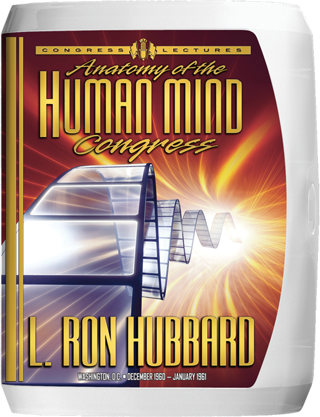Publisher of New York Times and International Bestselling Author L. Ron Hubbard
Anatomy of the Human Mind Congress

Anatomy of the Human Mind Congress
With new breakthroughs in place to reach any case, L. Ron Hubbard was ready to “throw the switch” on planetary expansion. And here is where that switch connected: with a new course to present Dianetics and Scientology basics in a whole new way. It followed from the simple premise: While one can demonstrate chemical reactions or the workings of machines, how does one demonstrate the parts and phenomena of the human mind and spirit? Mr. Hubbard provides the answer, and shows how to do it with the Anatomy of the Human Mind Course. Here, then, is his onstage demonstration of the “Things of Scientology,” each as solid and real as anything in the physical sciences. As he further explained, no previous field of the mind could ever demonstrate such things as they were all “figure-figure.” Well, there’s none of that here. Not when those live demonstrations included the most colorful and lively demonstrations of any Congress—from test tubes and static electricity, to skulls and brains—all to demonstrate what is the mind and what isn’t. Moreover, here is the means for every Scientologist to show people they are a spiritual being, what the mind really is and that Scientology can help them. And now you know why, in asking attendees, “Where do we go from here?” L. Ron Hubbard gave the answer, “We’re going to go all the way.” For the gates had been opened to bring understanding to everyone.
About Anatomy of the Human Mind Congress
I’m afraid the reality of this will all too soon be upon us. You’re just about to inherit this planet, whether you like it or not. I can only hope that you’re in good enough shape to like it. —L. Ron Hubbard
As Mr. Hubbard was to announce, the time had come for him to do exactly what he’d planned for ten years—open the entrance gates for floods of brand-new public. It was a decision that had everything to do with technical advances of the past year. As he told Congress attendees:
“It isn’t clearing cases that has held us up. It’s starting cases that has held us up. Getting cases started. If we get them started, we can clear them. Getting them started into stable gains, that’s been our problem. And we can sweep them all up these days.”
After years of research, he had already developed processes to reach any case and the technology to advance them to Clear. There only remained one barrier—getting the preclear in session so the technology could be applied. Such was his primary focus of 1960. And what he was addressing had everything to do with the very definition of “in session”: Interested in own case and willing to talk to the auditor. So came his startling discovery that some preclears had no interest in their own case. And without that, no case gain was even possible! Investigating further, he isolated four factors that prevented interest and, most significantly, the factor of help. In point of fact, they weren’t interested in handling their own cases because they didn’t even believe help was possible.
Whereupon, Mr. Hubbard made the breakthrough on “starting cases,” with the development of Presession Processes, so called because they handled the factors necessary for a session to even begin—hence, pre session.
Releasing them for immediate use in dissemination (London Congress on Dissemination & Help), he next began a new course, the 1st Saint Hill Advanced Clinical Course, to teach auditors their full use in auditing. For quite in addition to bringing new people up to interest and beginning their first auditing, those factors of presession were vital for every Scientologist’s case:
“All right. Sometime in October of 1960 I became aware of the fact that we had it taped. The 1st Saint Hill ACC was moving cases up the line wholesale that had never moved before in years of processing. There were some of those cases that had never moved under processing, and we moved them. We had it taped right there.”
All of which explains what L. Ron Hubbard brought to this Congress. For if the past ten years had concentrated on technical development to make this achievement possible, it was now time to take that next inevitable step. As Ron explained:
“Now it’s safe to open that front door. Take them all, take them all.”
Moreover, he knew exactly how he would do it. For combining all his years of development, including every factor that prevented case gain, he’d developed a brand-new course that epitomized the very hallmark of Dianetics and Scientology:
“What we have done that is spectacular is to make a complete breakthrough in the field of the human mind, taking the predictable, practical character of the physical sciences and moving them over into the humanities. And that is what has happened in Dianetics and Scientology.”
And therein also lay the substance of what he presented as the Anatomy of the Human Mind Course. Its premise was obvious. If huge portions of the population did indeed think no help was possible, it was due in no small measure to the fact that “the world of the mind” had always belonged to the “figure-figure” of philosophy.
Yet, as Mr. Hubbard next presented, there were 20 items—“Things”—in Dianetics and Scientology that were as “solid as test tubes” and which could be shown and demonstrated in the physical universe.
So began one of the most colorful Congresses in history. For if the Shoreham Hotel had already seen everything from Group Processing to Upper Indoctrination TRs, then here were bubbling test tubes, plastic skulls, puppets, brains, and even fires!
But even more to the point, having developed technology to make Clears, L. Ron Hubbard now placed in the hands of every Scientologist the simplest means imaginable to bring an awareness to every other being not yet on the road. And therein lay the substance of these words:
“How far are we going to go now?
“Well, I can tell you frankly, we’re going to go all the way.”
| Format: | Compact Disc |
| Lectures: | 5 |
